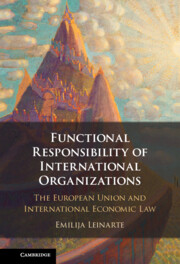 Functional Responsibility of International Organisations
Functional Responsibility of International Organisations Book contents
- Functional Responsibility of InternationalOrganizations
- Functional Responsibility of International Organizations
- Copyright page
- Dedication
- Contents
- Preface
- Acknowledgements
- Table of Cases
- Abbreviations and Acronyms
- 1 Introduction
- Part I The Legal Foundations of the International Responsibility of the European Union
- 2 The Governing Law
- 3 Independent Responsibility of the EU and Its Member States
- 4 The Concept of an Organ and Agent of the EU
- Part II Functional International Responsibility
- Bibliography
- Index
4 - The Concept of an Organ and Agent of the EU
from Part I - The Legal Foundations of the International Responsibility of the European Union
Published online by Cambridge University Press: 09 December 2021
- Functional Responsibility of InternationalOrganizations
- Functional Responsibility of International Organizations
- Copyright page
- Dedication
- Contents
- Preface
- Acknowledgements
- Table of Cases
- Abbreviations and Acronyms
- 1 Introduction
- Part I The Legal Foundations of the International Responsibility of the European Union
- 2 The Governing Law
- 3 Independent Responsibility of the EU and Its Member States
- 4 The Concept of an Organ and Agent of the EU
- Part II Functional International Responsibility
- Bibliography
- Index
Summary
The principle of joint responsibility is only halfway to solving the question of the international responsibility of the EU. That the EU and its Member States are independently responsible for their joint obligations does not necessarily mean that a breach will result in their joint and several responsibility. Chapter 4 accordingly addresses the exclusive responsibility of the EU and its Member States. This chapter explores the hypothesis suggested by the European Commission that authorities of the EU act as de facto organs of the Union when they implement EU law. For this purpose, this study delves into the travaux préparatoires of the ILC rules of responsibility to search for the concept of an organ and agent. It is suggested that while the ILC adopts a broad reading of these terms, international dispute-settlement practice does not support the European Commission’s claim that conduct of Member States’ organs is attributed to the EU when they carry out EU policies.
Keywords
Information
- Type
- Chapter
- Information
- Functional Responsibility of International OrganisationsThe European Union and International Economic Law, pp. 70 - 92Publisher: Cambridge University PressPrint publication year: 2021